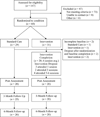Behavioral Parent Training in Infancy: A Window of Opportunity for High-Risk Families
- PMID: 26446726
- PMCID: PMC4826322
- DOI: 10.1007/s10802-015-0089-5
Behavioral Parent Training in Infancy: A Window of Opportunity for High-Risk Families
Abstract
To meet the mental health needs of infants from high-risk families, we examined the effect of a brief home-based adaptation of Parent-child Interaction Therapy (PCIT) on improvements in infant and parent behaviors and reductions in parenting stress. Participants included 60 infants (55 % male; average age of 13.5 ± 1.31 months) who were recruited at a large urban primary care clinic and were included if their scores exceeded the 75th percentile on a brief screener of early behavior problems. Most infants were from an ethnic or racial minority background (98 %) and lived below the poverty line (60 %). Families were randomly assigned to receive the home-based parenting intervention or standard pediatric primary care. Observational and parent-report measures of infant and parenting behaviors were examined at pre- and post-intervention and at 3- and 6-month follow-ups. Infants receiving the intervention were more compliant with maternal commands at the 6-month follow-up and displayed lower levels of externalizing and internalizing behavior problems across post and follow-up assessments compared to infants in standard care. Mothers receiving the intervention displayed a significantly higher proportion of positive and lower proportion of negative behaviors with their infant during play compared to mothers in the standard care group. There were no significant group differences for parenting stress. Results provide initial evidence for the efficacy of this brief and home-based adaptation of PCIT for infants. These findings highlight the benefit of identification and intervention as early as possible to promote mental health for infants from high-risk families.
Keywords: Behavior problems; Early intervention; Infancy; Parent training; Risk.
Conflict of interest statement
The authors report no conflicts of interest related to this work.
Figures


References
-
- Abidin RR. Parenting Stress Index Manual, Third Edition: Professional Manual. Odessa, FL: Psychological Assessment Resources, Inc; 1995.
-
- Aguilar B, Sroufe LA, Egeland B, Carlson E. Distinguishing the early-onset/persistent and adolescence-onset antisocial behavior types: From birth to 16 years. Development and Psychopathology. 2000;12:109–132. Retrieved from http://journals.cambridge.org. - PubMed
-
- Alink LR, Mesman J, van Zeijl J, Stolk MN, Juffer F, Koot HM, van Ijzendoorn MH. The early childhood aggression curve: Development of physical aggression in 10- to 50-month-old children. Child Development. 2006;77:954–966. - PubMed
-
- Bagner DM, Eyberg SM. Father involvement in parent training: When does it matter? Journal of Clinical Child and Adolescent Psychology. 2003;32:599–605. - PubMed
Publication types
MeSH terms
Grants and funding
LinkOut - more resources
Full Text Sources
Other Literature Sources
Medical

